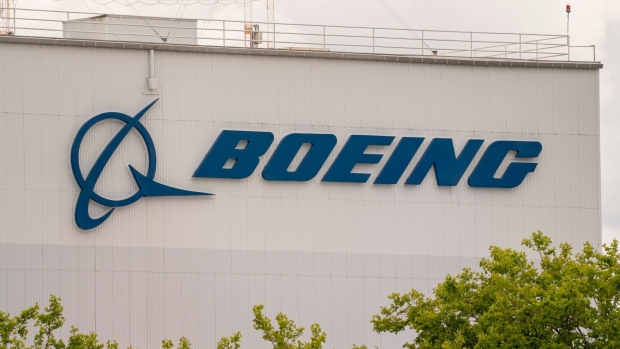Mar 19, 2024
Boeing Explores Defense Asset Sales to Boost Balance Sheet
, Bloomberg News

(Bloomberg) -- Boeing Co. has been exploring the sale of at least two of its defense businesses, as the beleaguered aircraft manufacturer fights through its biggest crisis in years.
Financial advisers have contacted potential buyers on Boeing’s behalf to gauge interest in several smaller units, according to people familiar with the discussions, who asked not to be identified because the deliberations are confidential. The efforts have been underway for about a year, predating the Jan. 5 accident that has placed the planemaker under intense scrutiny, one of the people said.
Assets potentially on the block include Boeing’s Digital Receiver Technology Inc. unit, which makes products for government intelligence and defense customers, the people said. Possible buyers have also been sounded out about some defense programs in its global services division, some of the people said.
The planemaker earlier explored divesting its Argon ST subsidiary, although that process is on hold, one of the people said. It acquired Argon, which makes systems for military command and control, surveillance and reconnaissance, for about $775 million in 2010.
Boeing declined to comment. The stock rose as much as 1.1% after Bloomberg reported on the deliberations.
The company also continues to weigh options for its stake in United Launch Alliance, the rocket-launch joint venture co-owned with Lockheed Martin Corp., the people said. Bloomberg News reported in January that ULA had attracted interest from Jeff Bezos’s Blue Origin LLC.
Boeing has made no definitive decision on disposals, and plans could still change, some of the people said. The company routinely reviews its portfolio of assets, these people said.
Spirit Talks
The deliberations come as Boeing faces heightened government scrutiny of its commercial aircraft manufacturing, following a near-catastrophic accident in early January on board a 737 Max 9 aircraft. Since then, Boeing and Spirit AeroSystems Holdings Inc., which makes most of the 737 frame, have confirmed that they are in talks about bringing the former subsidiary back into the Boeing fold.
Such a transaction could cost Boeing more than $3 billion, based on Spirit’s market value before the talks became public two weeks ago.
Pressure has been building on Boeing Chief Executive Officer Dave Calhoun to chart a way out of the crisis, which risks prolonging its recovery from years of financial losses stemming from the Covid pandemic and an earlier global grounding of the Max family of aircraft. The company needs to pare its debt load to fund future growth, and was counting on a rapid step-up in 737 production over the next two years to generate cash.
That plan was stymied by fallout from the Jan. 5 accident because regulators have now capped its output of the cash-cow 737 until the company has shown that it can get its manufacturing processes in order. Boeing shares have lost more than 30% in value this year, twice as much as the next-worst laggard on the Dow Jones Industrial Average.
Any defense sale would face scrutiny from the Pentagon, which has expressed concern about consolidation among defense prime contractors. Antitrust regulators such as Lina Khan, chairwoman of the Federal Trade Commission, have also been critical of Boeing’s monopoly over US civil aircraft production.
(Updates with stock performance)
©2024 Bloomberg L.P.


